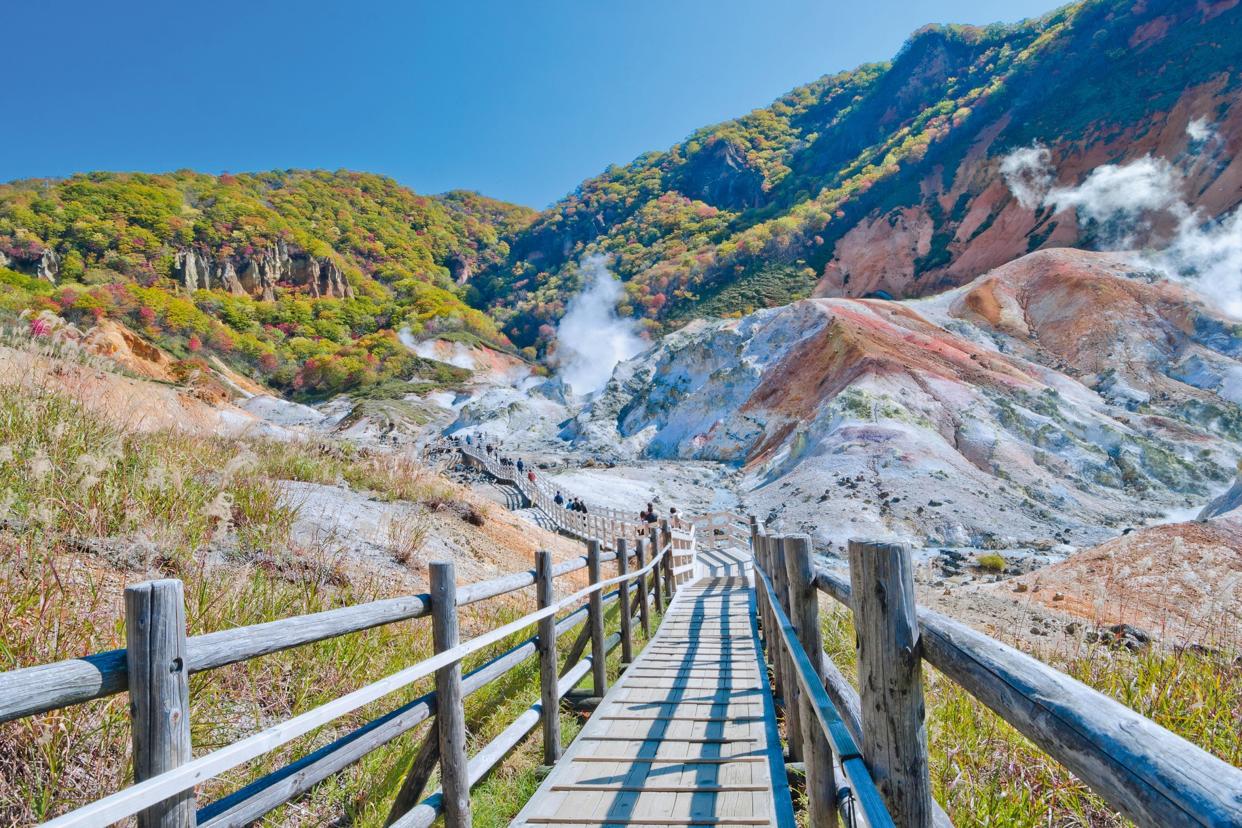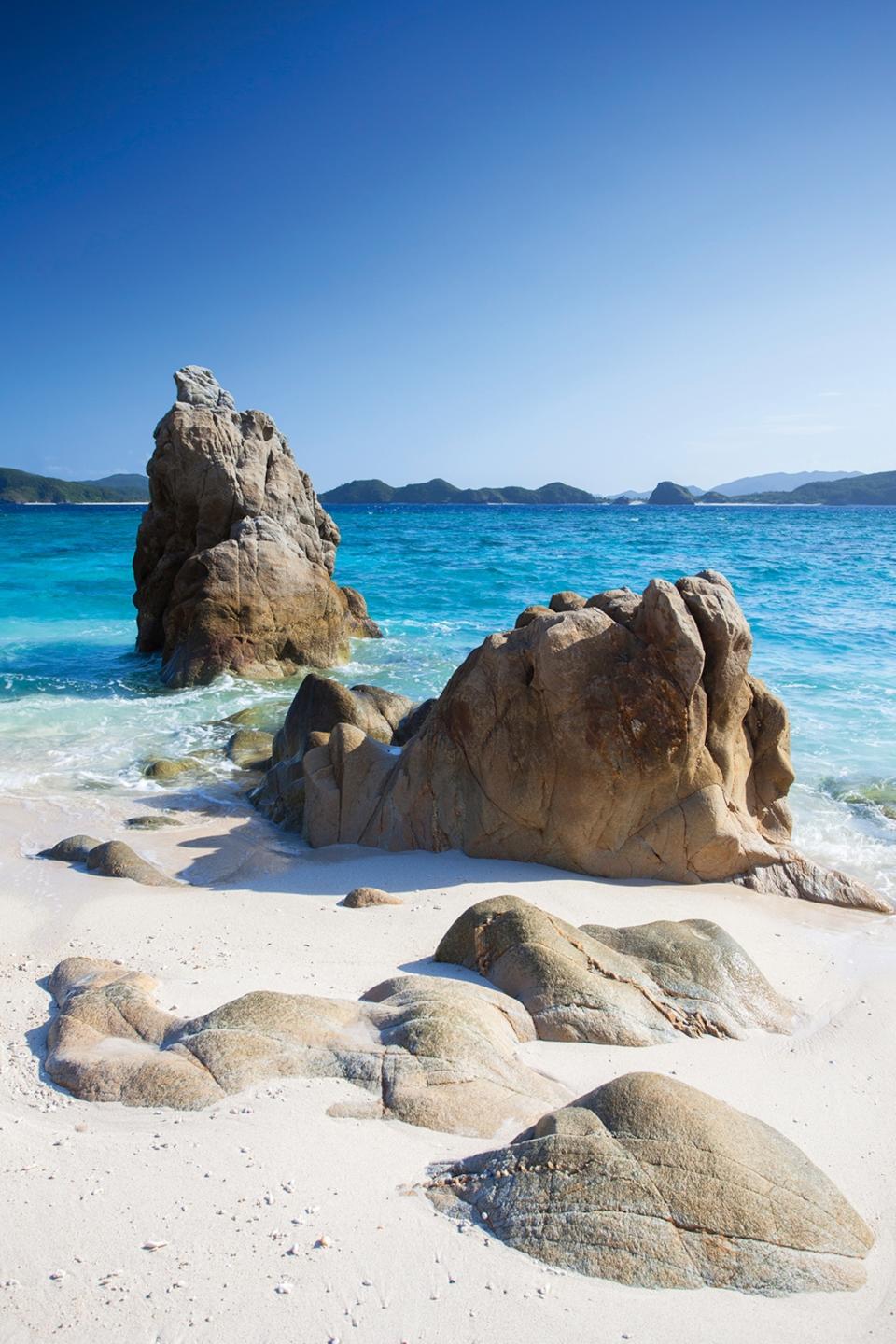
This article was produced by National Geographic Traveller (UK).
Straddling four tectonic plates, Japan’s landscape buckles and ruptures at the whims of the fiery Pacific Rim. The result is dramatic: a beautiful, ever-changing crust that concertinas, gurgles and fissures into rippled mountains, hot springs and ocean trenches.
This trip explores the best of the country’s contrasting scenery. It begins in Hokkaido, the most northerly part of the archipelago, and finishes in the islands of Japan’s southerly Okinawa Prefecture. Reaching a latitude of 45°N, Hokkaido can receive 50 feet of snow in winter, while spring sees Ussuri brown bears shake hibernation from their shaggy coats.
A day’s bullet train ride south brings travellers to the centre of Honshu island, where the Japanese Alps surge into the sky. Whitewater rafters can rush through the foothills, while hikers conquer treacherous peaks or wander picturesque old trade routes.
Southbound flights to Naha from Tokyo or Osaka bring you next to Okinawa, where Japan’s landmass peters out into a subtropical archipelago of green turtles and white sands. Once home to the Ryukyu Kingdom, the region later became a Second World War battleground and is now a haven for snorkellers and divers.
Highlights
1. Daisetsuzan National Park
Hokkaido’s wild interior is home to Japan’s largest national park, nicknamed ‘the Playground of the Gods’. An inferno of sulphur and obsidian rock, seasonal blooms and belching terracotta calderas, it’s a region with isolated onsen (hot springs) and scene-stealing treks. Climb the Asahidake stratovolcano (7,516ft), traverse gorges and spot local wildlife such as loping brown bears and the anime-inspiring pika, a round-eared rabbit relative.
2. Noboribetsu
In Shikotsu-Toya National Park, Noboribetsu on the southwest coast is one of Japan’s best onsen resorts. The town’s ryokan (traditional inns) are fed with geothermal waters, while its streets are crowded with comical demon statues as a nod to Jigokudani (‘Hell Valley’): a barren white-and-red landscape to the north.
3. The Japanese Alps
The best whitewater rafting is found on the east edge of the Japanese Alps, on the Tone River, with tours from the town of Minakami. Japan’s second-longest waterway pours from Mount Ominakami in a riot of snow-cold froth, with class 4+ rapids in spring, mellowing out to class 1–2 towards summer. After drying off, head some 120 miles west into the mountains to hike the old Nakasendo trade route through cypress forests around the town of Magome, or tackle formidable peaks in Kamikochi.


4. Kerama islands
A half-hour ferry ride west of Okinawa’s namesake main island, a smattering of smaller isles make up Kerama-shoto National Park. With brilliant aquamarine seas, they’re a popular day trip and have some of Japan’s best diving and snorkelling — but it’s worth staying overnight in a local guesthouse. Walk off Zamami Island’s white-sand beaches into turtle-filled waters, dive Aka’s reefs while spotting lionfish and pufferfish, and watch nursing humpback whales from the breeze-blown coast (December to April). seasir.com
5. Yanbaru
While Okinawa’s south is largely given over to Ryukyu culture and war memorials, its north is thick with sinuous jungle. Called Yanbaru, this UNESCO-listed national park area is home to endangered and endemic species including the flightless Okinawa rail and Ryukyu long-tailed giant rat. A highlight is the 40-minute forest trail hike to Hiji Falls. In Yanbaru’s north, visit the sprawling banyan trees of Daisekirinzan — a natural shrine.
Published in the September 2024 issue of National Geographic Traveller (UK).
To subscribe to National Geographic Traveller (UK) magazine click here. (Available in select countries only).







